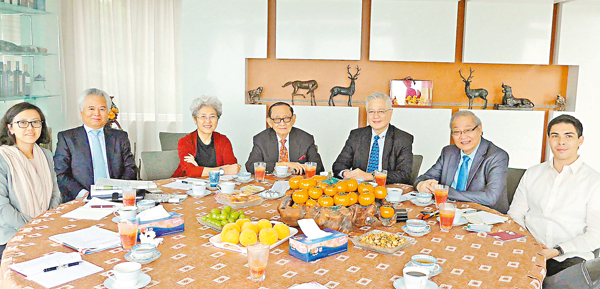 ■菲律賓前總統拉莫斯(中)在香港與老朋友傅瑩女士(左三)等人飯敍。 資料圖片
■菲律賓前總統拉莫斯(中)在香港與老朋友傅瑩女士(左三)等人飯敍。 資料圖片【原文】菲律賓前總統拉莫斯(Fidel Ramos)8月8日抵港,將此行稱為「破冰之旅」("ice-breaking" mission)。他表示,希望中菲兩國在不久的將來可以展開正式官方對話。自菲律賓前任政府單方面提出所謂「南海仲裁」以來,兩國關係陷入低谷,但兩國是傳統友好鄰邦,兩國應在排除域外國家影響和干擾的情況下,共同努力改善雙邊關係(bilateral ties),恢復對話合作,推動中菲關係健康穩定發展。
對華友好 重啟對話理想人
現年88歲的拉莫斯多年來對華友好,在亞洲地區受到尊重,是溝通中菲、爭取重啟正式接觸對話的理想人選。拉莫斯在1992年至1998年擔任菲總統期間(during his presidential term),對華奉行睦鄰友好政策,又主張通過協商解決南海爭議,讓中菲關係在健康的軌道上運行。
拉莫斯還是一個「知華派」,基本上每年都來中國,對中國非常了解,還是博鰲論壇(Boao Forum for Asia)的創始人之一和首屆理事長。在菲律賓國內,拉莫斯也是杜特爾特(Rodrigo Duterte)競選期間的堅定支持者。
中國已經連續6年成為東盟最大的貿易夥伴,更提出了建設21世紀海上絲綢之路(21st Century Maritime Silk Route Economic Belt)和構建中國-東盟命運共同體以及中國-東盟「2+7合作框架」等倡議。
正如拉莫斯出發前所指,中國目前是世界強大的經濟體,21世紀的菲律賓不應被排除在中國貿易夥伴的名單外。
拉莫斯此行本身發出的訊息,就是杜特爾特政府不會延續阿基諾三世(Benigno Aquino III)的「親美遠華」外交政策。杜特爾特早前在宿霧一個軍營發表講話,指名道姓以髒話怒罵美國駐菲大使古德伯格(Philip Goldberg)干預內政,宣稱若美國要斷絕與菲律賓的外交關係,他也不在乎。由此觀之,菲律賓的外交政策,有可能不再事事唯美國馬首是瞻。
首要尊重歷史 其次務實
誠然,要解決南海的領土爭議問題,需要相關國家在幾個前提下長期不懈努力。首先要尊重歷史,其次要有務實(pragmatic)、理性的態度和解決問題的誠意。在這方面,中國早就提出「擱置主權爭議、共同開發資源」的主張,這是在維持良好合作關係前提下,解決問題的務實做法,應該成為有關各方(stakeholders)磋商談判的基調。 (摘錄自文匯報社評11-8-2016) (標題及小標題為編輯所加)
Ramos to break China-Philippines ice
【譯文】Former Philippine president Fidel Ramos arrived in Hong Kong on August 8 on an "ice-breaking" mission. He says that he is looking forward to resuming dialogues between China and the Philippines. Even though ties between the two countries have been frozen ever since Manila's arbitration quest on the South China Sea, China and the Philippines share a longstanding and a close relationship, and therefore should work closely together to revive bilateral ties without interference from third parties.
Pro-China stance welcomed
Ramos, 88, has a long history of friendly exchanges with China and is well respected in Asia. He is naturally the best choice for the job as an ice-breaker. During his presidency from 1992 to 1998, Ramos has adopted multiple approaches to develop a constructive relationship with China, including bilateral negotiations over South China Sea disputes. The two countries enjoyed a healthy relationship during his presidential term.
As a China specialist, Ramos frequently visits mainland China and is very familiar with China affairs. He is also the founding chairman of the Hainan-based Boao Forum for Asia. Within the Philippines, Ramos is an ardent supporter of Rodrigo Duterte, the newly elected president.
Just as Ramos says, the Philippines of the 21st century should not be excluded in China's list of trading partners while the latter is one of the largest economy in the world. Being ASEAN's largest trading partner for six consecutive years, China has also proposed multiple economic initiatives such as the 21st Century Maritime Silk Route Economic Belt, China-ASEAN Community of Common Destiny and the "2 plus 7" cooperation framework between ASEAN and China.
Ramos' visit to Hong Kong carries a clear message to China: the Duterte administration will abandon Benigno Aquino III's pro-US-anti-China stance. In fact, Duterte has insulted the US ambassador to Manila, Philip Goldberg, with profane remarks during his speech in a barracks in Cebu. He accused Mr. Goldberg of intervening the Filipino internal affairs. These might be hints that suggest Manila being less dependent on the US.
Respect history and be pragmatic
To settle the South China Sea sovereignty disputes, involved parties must first acknowledge the history of the waters, be rational and show sincerity in tackling the issue. China's proposal to "shelve differences and seek joint development" is a pragmatic solution to the decades-old dispute, and should be taken seriously by all stakeholders in the region as the basis of multilateral negotiations.
■Jeffrey Tse [ywc_jeffrey@hotmail.com]
Exercise
1. 雙邊關係
2. 東盟
3. 中國-東盟「2+7合作框架」
4. 宿霧
5. 中國-東盟命運共同體
6. 拉莫斯
7. 杜特爾特
8. 阿基諾三世
9. 21世紀海上絲綢之路
10. 博鰲論壇
Answer
1. bilateral ties
2. Association of Southeast Asian Nations (ASEAN)
3. China-ASEAN "2 plus 7" cooperation framework
4. Cebu
5. China-ASEAN Community of Common Destiny
6. Fidel Ramos
7. Rodrigo Duterte
8. Benigno Aquino III
9. 21st Century Maritime Silk Route Economic Belt
10. Boao Forum for Asia
